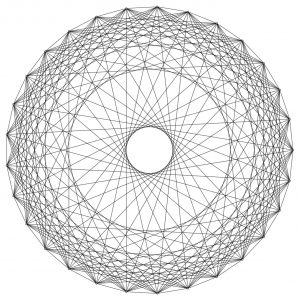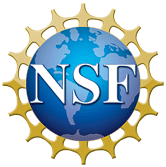Research: Number Theory
Summer School 2021: Applications of Expander Graphs to Number Theory and Computer Science
2021 2020 2019 2018 2017 2016 2015 2014 2013 2012

From May 24 to 28, 2021, the University of North Carolina Greensboro will host the UNCG Summer School in Computational Number Theory and Algebra: Applications of Expander Graphs to Number Theory and Computer Science.
Expanders are graphs satisfying very strong connectivity properties. There are precise definitions, but, roughly speaking, every “small” set of vertices in an expander has “many” neighbors outside that set. We will introduce expanders and then explore the many connections they have to topics in number theory and computer science.
The school will run in morning and afternoon zoom sessions for the five days between May 24 and May 28, 2021. In each session, one of our well-known speakers will give a lecture. Then everyone will break into small zoom groups to work on problem sets together with mentors. All problems are aimed at increasing the students’ understanding of the material by working with it. At the end of each session, the whole school will reconvene to talk over the results and for further insight. The talks early in the week will introduce the students to the subject and those later in the week cover related areas of current research and unsolved problems.
This school is targeted primarily to early stage graduate students in mathematics with an interest in number theory.
Click here for a flier to post: UNCG_expander_school_2021
Speakers
- Irit Dinur, Weizman Institute of Science
- Alex Kontorovich, Rutgers University
- Emmanuel Kowalski, ETH Zürich
Topics
Definitions – combinatorial expansion, laplacian spectrum, random walks.
Constructions – randomized constructions, Cayley graphs, Ramanujan graphs, the Zig-Zag Product.
Applications – survey, sieves in discrete groups, Apollonian circle packings, arithmetic geometry, error correcting codes.
Schedule
Monday May 24 to Friday May 28, 2021.
Mornings: 9 AM – 11:30 AM, Eastern Standard Time
Afternoons: 1 PM – 3:30 PM, Eastern Standard Time
Schedule per session: 50 minutes of lecture, 80 minutes of problem solving in small mentored groups, 20 minutes of large group discussion
Detailed Schedule
All sessions meet by zoom, check your email for the link. All times are Eastern Standard Time.
5/24 Monday
9 AM-11:30 AM Lecture 1 (Kowalski) Basic graph theory, combinatorial definition of expanders.
1 PM – 3:30 PM Lecture 2 (Kowalski) Spectral definition, equivalence of definitions.
5/25 Tuesday
9 AM-11:30 AM Lecture 3 (Kowalski) Types of expanders, Cayley graphs, random graphs.
1 PM – 3:30 PM Lecture 4 (Kontorovich) Apollonian packings.
5/26 Wednesday
9 AM-11:30 AM Lecture 5 (Dinur) The zig-zag product.
1 PM – 3:30 PM Lecture 6 (Kontorovich) Zaremba problem.
3:45 PM Social event.
5/27 Thursday
9 AM-11:30 AM Lecture 7 (Dinur) Application to error-correcting codes.
1 PM – 3:30 PM Lecture 8 (Kontorovich) Circle methods, sieve methods.
5/28 Friday
9 AM-11:30 AM Lecture 9 (Kowalski) Proofs of equidistribution and sketch of some applications.
1 PM – 3:30 PM Lecture 10 (Kontorovich) Infinite volume counting methods.
3:45 Social event.
Lecture Notes, Problem Sets, and Lecture Recordings
Youtube playlist of lecture recordings.
Kowalski’s full set of expander lectures.
Lecture notes and problem sets for lectures 1-3.
Lecture 4 slides and exercises.
Lecture 4 papers:
–Survey paper on Apollonian packings (+Zaremba, Lecture 6)
–Paper with Baragar on “fastest?” Apollonian solution.
–Sarnak’s survey on Apollonian packings (including proof of Descartes as discussed in Lecture 4)
–Fuchs’s thesis (why local obstructions are mod 24)
-Higher dimensional stuff (one with Nakamura another with Kapovich)
–The almost-all local-global theorem with Bourgain.
Lecture 5 slides and exercise.
Lecture 5 links:
–MPS Conference on High Dimensional Expanders (lots of videos about the state of the art in 2019)
–Improved Product-Based High-Dimensional Expanders (5/19/21)
Lecture 6 slides and exercises.
Lecture 6 papers:
–Discussion of Zaremba+McMullen+ELMV (skip past the first two lectures on topics not covered)
–Full local-global for sphere packings.
–Main Zaremba paper (don’t really try to read this; it’s pretty hard…)
Lecture 7 slides and exercises.
Lecture 8 slides and more exercises.
Lecture 8 papers:
–Sieve methods in group theory I: Powers in linear groups
–On toric orbits in the affine sieve
Lecture 10 slides and more exercises.
Selberg’s eigenvalue conjecture.
Organizer
Clifford Smyth, University of North Carolina at Greensboro
Acknowledgements
 The organizers, speakers, and participants are all grateful for the support from UNCG and the NSF grant (DMS-1802448) that makes this school possible.
The organizers, speakers, and participants are all grateful for the support from UNCG and the NSF grant (DMS-1802448) that makes this school possible.





